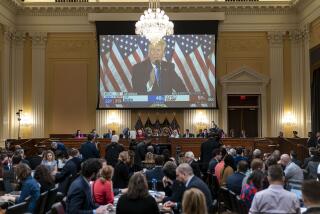Key Hearing in Keating Case to Begin Today : Thrifts: The federal government is trying to ban the former head of Lincoln Savings & Loan from the industry and recover $130.5 million from him and six others.
- Share via
Federal savings and loan regulators take on their biggest enforcement action today as they try to ban Charles H. Keating Jr. and six others from the industry and recover $130.5 million in losses on four Lincoln Savings & Loan deals.
The administrative hearing sought by the Office of Thrift Supervision also marks the first time that any of the government agencies or private investors arrayed against the operators of the scandal-plagued Irvine thrift will have a chance to prove their case in a trial-like hearing.
The OTS, which regulates the nation’s S&Ls;, has reserved a courtroom in Los Angeles County Superior Court for eight days over the next two weeks. But both the agency and lawyers for the defendants expect the hearing to go on for much longer.
Proposed witnesses alone number 45 for the government and at least 59 for Keating, including Federal Reserve Board Chairman Alan Greenspan, former Federal Home Loan Bank Board Chairman Edwin J. Gray and L. William Seidman, chairman of the Federal Deposit Insurance Corp.
Regulators seized Lincoln in April, 1989, a day after its parent company, American Continental Corp. of Phoenix, filed for bankruptcy. Lincoln’s failure is expected to cost taxpayers $2.6 billion, the largest single bill for a failed thrift. In addition, thousands of American Continental bondholders lost more than $250 million.
Federal prosecutors are expected to be watching the OTS proceedings carefully because the four accusations against the Keating group involve transactions that also are major parts of a two-year-long federal grand jury investigation into Lincoln’s collapse, sources close to the case said.
The U.S. Justice Department, they said, was so concerned that an OTS hearing would reveal secret grand jury testimony that it asked the thrift agency to delay the proceeding. Spokesmen for both agencies declined to comment about any interagency pressure being applied.
The hearing was scheduled to start last Monday but was delayed a week at the request of a retired federal judge who was presiding over settlement talks involving a tangle of civil cases that have been consolidated in Phoenix. The judge had told the OTS that a settlement could give the agency what it wanted most--a lifetime industry ban on Keating and others.
Defense attorneys said they plan to call some federal grand jury witnesses.
“It’s inevitable in defending the OTS case that we will call witnesses who have testified before the federal grand jury,” said Stephen C. Neal, Keating’s attorney.
Abbe David Lowell, attorney for Keating’s top aide, Judy J. Wischer, said the hearing will give him a chance to learn about a potential criminal case before expected federal indictments are returned.
“If I have the ability to subpoena witnesses and use that opportunity to show that Judy Wischer did no wrong, you bet I’m going to call everybody I can,” Lowell said. “I can’t wait for the opportunity to put every government witness under oath, question them and lock their answers in.”
The OTS accusations involve four of the most publicized Lincoln deals. Those transactions also are at the heart of investor lawsuits seeking more than $250 million and the $2.7-billion fraud and racketeering lawsuit filed by the Resolution Trust Corp., the federal agency that manages and liquidates failed thrifts.
The OTS accuses the seven former executives of causing Lincoln:
* A $94-million loss from a tax-sharing agreement. The OTS contends that Lincoln forwarded the money to American Continental ostensibly to pay for its share of income taxes, even though the S&L; didn’t owe any taxes.
* A $24.2-million loss from financial support given to the Hotel Pontchartrain in Detroit. The OTS contends that Lincoln financed the purchase of the hotel for a Keating-led partnership without sufficient evaluation or documentation and that loans eventually exceeded the hotel’s appraised market value.
* A $12.3-million loss from improper funding of an American Continental employee stock option plan. The OTS contends that Keating, his family and top executives enriched themselves by selling stock to the ESOP, which paid for it with loans that Lincoln guaranteed.
* A $4.4-million loss from real estate transactions at Hidden Valley Ranch, a planned community southwest of Phoenix. The OTS contends that Lincoln bought and later financed sales of vacant desert land to improperly boost Lincoln earnings and move tax payments to the parent company. This alleged loss is included in the $94-million tax-sharing amount.
Besides Keating and Wischer, the other respondents, as they are known in this proceeding, are former American Continental executives Robert J. Kielty and Andre A. Niebling; Keating’s son, Charles H. Keating III, and two Keating sons-in-law, Robert J. Hubbard Jr. and Robert M. Wurzelbacher Jr.
Keating, Wischer and Robin S. Symes, a former Lincoln president, also face 21 counts in a state grand jury indictment that accuses them of violating state securities laws in the sale of American Continental bonds at Lincoln offices. They will go to trial Aug. 2. A fourth defendant in that case, Ray C. Fidel, another former Lincoln president, pleaded guilty to six counts and will testify against his co-defendants.
More to Read
Inside the business of entertainment
The Wide Shot brings you news, analysis and insights on everything from streaming wars to production — and what it all means for the future.
You may occasionally receive promotional content from the Los Angeles Times.









